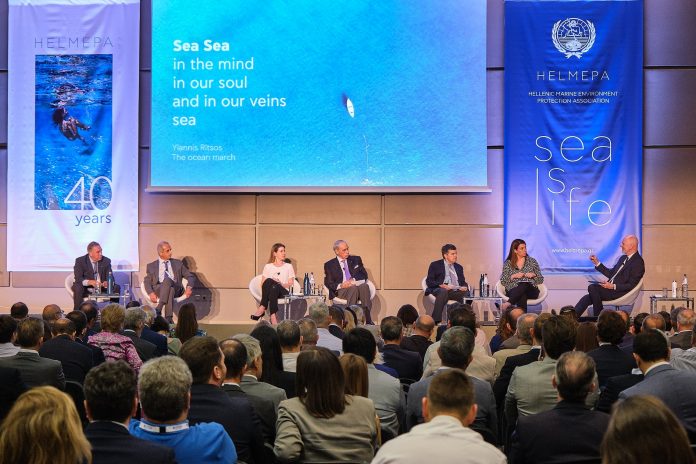Shipping is required to face the complex challenges placed by the progressively stricter IMO and EU environmental legislation and the financial issues related thereto, according to the Greek minister of Maritime Affairs and Insular Policy, Ioannis Plakiotakis.
In his keynote during the opening panel of the Hellenic Marine Environment Protection Association (HELMEPA) Conference on the third day of this year’s Posidonia Exhibition, Plakiotakis, referred to decarbonisation as a “flaming issue” and as “one of the biggest challenges for shipping”.
The Greek minister pointed out, “Shipping has to secure, in the very near future, worldwide availability of safe alternative low and zero carbon fuels and the related infrastructure. We are, however, still far from there.”
Additionally, Plakiotakis highlighted the importance of new financial instruments and resources to fund the journey to decarbonisation.
“Higher standards of safety and environmental performance often come from different organisations, but always at an important financial cost. Financing of innovative solutions for the reduction of pollution from vessels and enhancement of energy efficiency of ships, including the installation of pioneering technological equipment, or the building of ships of innovative design and systems, presupposes the existence of funding mechanisms beyond the traditional ones,” he stated.
Meanwhile, the minister called on the EU and the International Maritime Research Board and Associated Fund to support and contribute to the required funding through sources such as the EU structural budget and other industry-led initiatives.
Secretary General of the International Maritime Organisation, Kitack Lim, via a prerecorded video message, said, “Our goal is to ensure shipping continues to operate safely, securely, and efficiently. Our goal is to ultimately decarbonise shipping and for that, we need to collaborate between all stakeholders to develop sustainable solutions.”
In her speech, Melina Travlos, president of the Union of Greek Shipowners, noted, “The Union of Greek Shipowners will continue to work consistently and with dedication, in order to adopt realistic and feasible solutions that will lead our industry in this new era.”
Additionally, the chief executive officer of the Greek vessel owner Euroseas, Aristidis Pittas, who participated in a panel of the six largest shipping companies in Greece, commented, “We have been putting far too much emphasis on the E part of the ESG (Environmental, Social, and Governance) equation because I believe it is the easiest to tackle. Putting too much energy on the E we may be losing on the S, especially because the first thing we should care for is society and the social inclusion for everybody. We are trying to decarbonise faster than society at large can cope with, especially in developing countries. We should not forget society and the importance of good governance principles and practices for our companies.”







